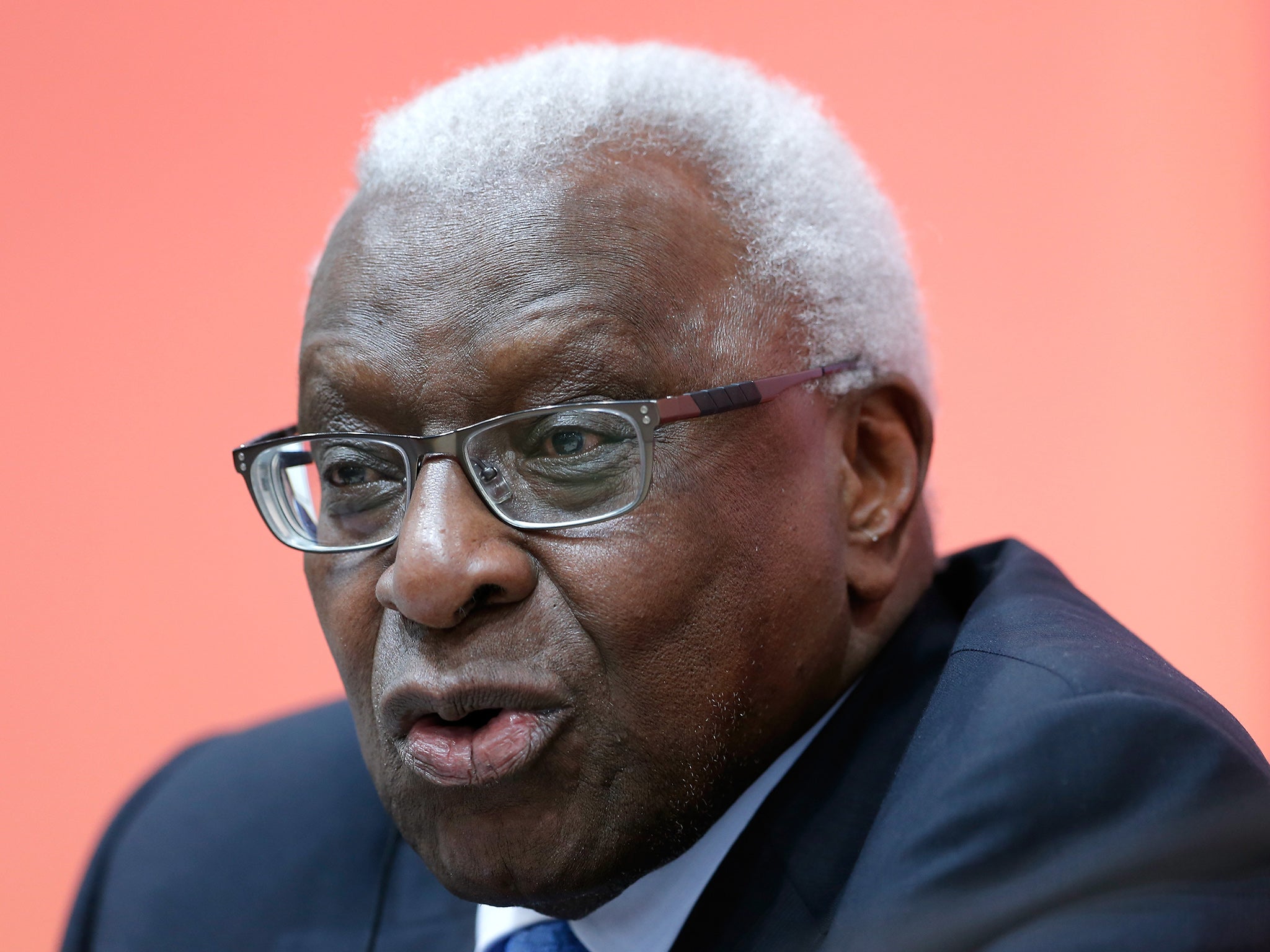Former IAAF president Lamine Diack under investigation in anti-doping probe
The case concerns payments allegedly used to cover up doping

Your support helps us to tell the story
From reproductive rights to climate change to Big Tech, The Independent is on the ground when the story is developing. Whether it's investigating the financials of Elon Musk's pro-Trump PAC or producing our latest documentary, 'The A Word', which shines a light on the American women fighting for reproductive rights, we know how important it is to parse out the facts from the messaging.
At such a critical moment in US history, we need reporters on the ground. Your donation allows us to keep sending journalists to speak to both sides of the story.
The Independent is trusted by Americans across the entire political spectrum. And unlike many other quality news outlets, we choose not to lock Americans out of our reporting and analysis with paywalls. We believe quality journalism should be available to everyone, paid for by those who can afford it.
Your support makes all the difference.The former head of global athletics is under criminal investigation for suspected corruption and money-laundering linked to a claimed cover-up of failed drug tests by Russian athletes.
In the latest scandal to hit world sport’s most powerful governing bodies, Lamine Diack is alleged to have taken 200,000 euros (£141,000) in kick-backs in return for deferring sanctions against an unknown number of Russian drug cheats prior to the 2012 London Olympics.
Diack, 82, stepped down in August as president of the International Association of Athletics Federation (IAAF) after 16 years in the post.
He was succeeded by Sebastian Coe, who insisted as he took on the role that reports questioning the integrity of the IAAF’s blood testing regime for hundreds of elite athletes were “a declaration of war on my sport”.
Lord Coe, who had earlier this week been in Moscow on his first official visit to Russia as head of the IAAF, volunteered himself for questioning when French police arrived at the body’s headquarters in Monaco on Tuesday to seize documents. The IAAF said it was “fully co-operating” with the criminal inquiry.
On a troubling day for the athletics body, it was announced that the former head of its medical and anti-doping department, Gabriel Dolle, had been also taken into custody in Nice in connection with the inquiry.
Habib Cisse, a senior legal adviser to Diack, has also been placed under investigation by the French authorities, who are acting on evidence provided by the World Anti-Doping Agency (WADA), which oversees the fight against drugs in sport, and the IAAF itself.
The confirmation of a corruption inquiry at the top of the IAAF means that along with Fifa, two of the wealthiest and most high-profile governing bodies in world sport are facing damaging questions about their credibility arising from the behaviour of past or current senior officials.
French prosecutors said Diack, who is Senegalese, and Cisse were arrested on Sunday and subsequently released on bail. A total of three investigating magistrates are handling the IAAF case.
The statement, the office of French financial investigators said: “Diack is suspected of receiving money in exchange for deferring sanctions for several Russian athletes who were found guilty of doping in 2011, ahead of the [2012] Olympic Games… The investigation also continues into whether other persons were involved in suspected corruption.”
A senior French official said that Diack was suspected of accepting “about 200,000 euros” to cover up an unknown number of failed drug tests by Russian athletes. The money is thought to have come from the Russian athletics federation, the Associated Press said.
Reacting to news of that the inquiry concerned his country’s athletes, Vitaly Mutko, the Russian sports minister, said: “God knows what’s going on there. We’ve already said that our federation had problems. The old management isn’t working there anymore. Understand that there are a lot of criminal cases going on in the world right now and those are unclear cases.”
A German television documentary last year made claims of widespread doping and concealment of cheating in Russian athletics, leading to the launch of investigations by both WADA and the IAAF.
But separate claims by The Sunday Times and German media that a third of medals won in endurance races at the Olympics and World Championships over a ten-year period were claimed by athletes with suspicious testing records drew a strong response from the IAAF and Lord Coe.
The former Olympic champion and organiser of the 2012 London Games strongly rejected the suggestion that the IAAF had sat on evidence of potential cheating and said his organisation would “come out fighting”.
Speaking before news broke of the raid on the IAAF headquarter by French police, Lord Coe said he had noted a “real appetite for change” during his visit to Moscow.
He said: “I felt a very strong support for our plans to modernise athletics. I expressed my uncompromising position on the issue of doping in athletics and the importance for the sport to build trust and defend clean athletes at all times.”
The IAAF said that it is “fully co-operating with all investigations as it has been from the beginning of the process”.
Join our commenting forum
Join thought-provoking conversations, follow other Independent readers and see their replies
Comments